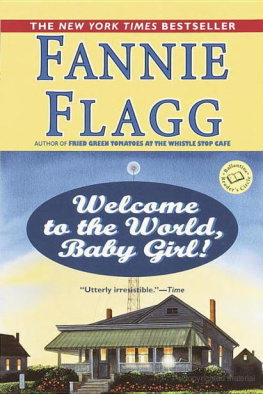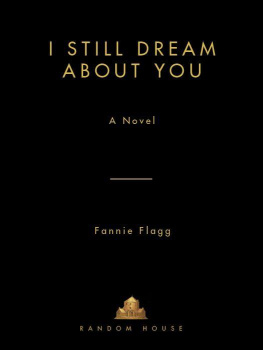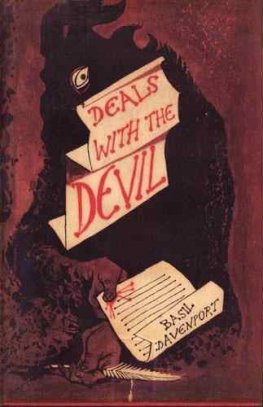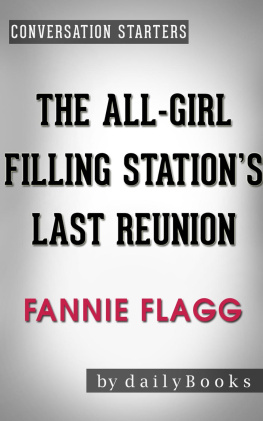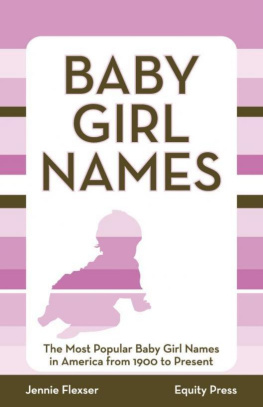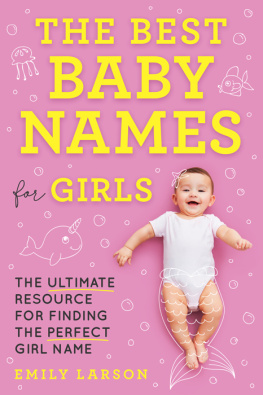Fannie Flagg - Welcome to the World, Baby Girl!
Here you can read online Fannie Flagg - Welcome to the World, Baby Girl! full text of the book (entire story) in english for free. Download pdf and epub, get meaning, cover and reviews about this ebook. year: 2011, publisher: Random House Publishing Group, genre: Art / Prose. Description of the work, (preface) as well as reviews are available. Best literature library LitArk.com created for fans of good reading and offers a wide selection of genres:
Romance novel
Science fiction
Adventure
Detective
Science
History
Home and family
Prose
Art
Politics
Computer
Non-fiction
Religion
Business
Children
Humor
Choose a favorite category and find really read worthwhile books. Enjoy immersion in the world of imagination, feel the emotions of the characters or learn something new for yourself, make an fascinating discovery.
- Book:Welcome to the World, Baby Girl!
- Author:
- Publisher:Random House Publishing Group
- Genre:
- Year:2011
- Rating:3 / 5
- Favourites:Add to favourites
- Your mark:
- 60
- 1
- 2
- 3
- 4
- 5
Welcome to the World, Baby Girl!: summary, description and annotation
We offer to read an annotation, description, summary or preface (depends on what the author of the book "Welcome to the World, Baby Girl!" wrote himself). If you haven't found the necessary information about the book — write in the comments, we will try to find it.
Welcome to the World, Baby Girl! — read online for free the complete book (whole text) full work
Below is the text of the book, divided by pages. System saving the place of the last page read, allows you to conveniently read the book "Welcome to the World, Baby Girl!" online for free, without having to search again every time where you left off. Put a bookmark, and you can go to the page where you finished reading at any time.
Font size:
Interval:
Bookmark:
I would like to thank the following, whose encouragement and support have been invaluable to me: Susie Glickman, Lois Scott, De-Thomas Bobo & Associates, Ulf Buchholz, Wendy Weil, Steve Warren, Sally Wilcox, Mrs. Ray Rogers, Evelyn Birkby, Colleen Zuck and staff, the State of Alabama, and especially all my friends and family, who are a joy to me every day.
ALSO BY FANNIE FLAGG
Cant Wait to Get to Heaven*
A Redbird Christmas
Standing in the Rainbow
Daisy Fay and the Miracle Man
(originally published as Coming Attractions)
Fried Green Tomatoes at the Whistle Stop Cafe
Fannie Flaggs Original Whistle Stop Cafe Cookbook
*forthcoming
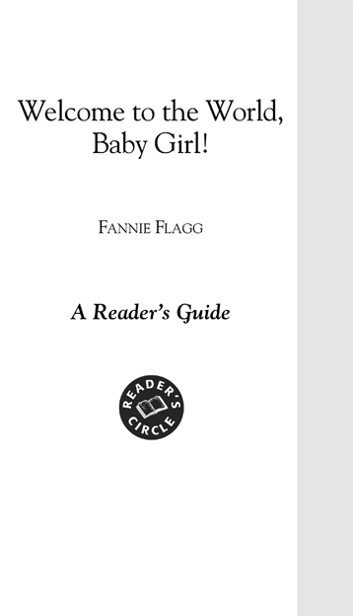
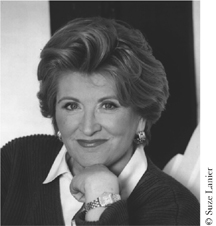
Fannie Flagg began writing and producing television specials at age nineteen and went on to distinguish herself as an actress and writer in television, films, and the theater. Her first novel, Daisy Fay and the Miracle Man, was a New York Times bestseller, as was Fried Green Tomatoes at the Whistle Stop Caf, which was produced by Universal Pictures as Fried Green Tomatoes. Ms. Flaggs script was nominated for both and won the highly regarded Scripters Award. Her acclaimed novel, Welcome to the World, Baby Girl!, is also a New York Times bestseller.
A Conversation with Fannie Flagg
Sam Vaughanwas Publisher, President, and Editor-in-Chief at Doubleday, then a Senior Vice President, and is now an Independent editor-at-large for the Random House imprints, including Ballantine Books. In addition to Fannie Flagg, he is currently editing Margaret Truman, Dave Barry, Elizabeth Spencer, and William F. Buckley Jr., among others.
Q: One of the things that struck me when first reading Baby Girl were the settingsMissouri and New York and to a lesser extent, Chicago and Washington, D.C. You hadnt forsaken the South entirelythank God for Sookiebut what did you have in mind? Were you bored by the Southern scene and did you not want to be typecast as a southern writer? Or did you want to show that characters like yours can exist anywhere?
FF: I would not mind at all if I were to be called a southern writer. Id be flattered, as a matter of fact. I am from Alabama, after all, and I still live there a great deal of the time, but what may be closer to the truth is that Im an American writer who writes about what I know best: middle class America. This is my familys background. I have never been extremely poor or extremely rich although I would not mind a bit being extremely rich. But as I have traveled around the country, Ive noticed that class or type defines a person far more accurately than a region.
Ive found middle class people, no matter where they live, tend to dress a certain way, think a certain way, just as the very rich are pretty much the same all across the country. For instance, my characters idea of a dream vacation, whether they live in Maine or Tennessee, might not be Paris or Rome first but a trip cross-country in a nice Winnebago RV to the Mall of America in Minnesota. Their idea of fine dining, driving out of St. Paul or Stillwater, might include stops at a few Crackerbarrel restaurants along the way. Such a trip, by the way, sounds pretty good to me.
I picked Missouri because its in the middle of the heartland of America, with all that such a phrase denotes. And what I admire most about this nation is its heart. We have been and still are the most generous country. Even though other countries to whom weve given lives and millions seem to hate the idea, we still give.
Q: You and big cities Youve lived in them. Youre read in them. In this novel, Manhattan seems like the root of all evil, especiallyin that phantasmagoric scene later in the book where one of the scurrilous scandal mongers gets swept away in the roar of a rushing sewer. Yet the two psychiatrists are fine people.
FF: Again, New York is just a metaphor for a certain type of person, or mind-set, or view of the world. Personally, I love New York. As you say, Ive lived there for about ten years. What I was trying to say is that large cities, like say New York and Los Angeles, etc., can change a person. What I dont like is the way that a city, with the struggle to survive, the rat race and the competition, too often promotes a jaded, cynical world view, a pessimistic, often suspicious outlook. Unfortunately, those who hold to this narrow view persist in regarding the rest of the country as stupid. They interpret manners for weakness, enthusiasm is suspect, and ethics are navet.
This is not true for everyone. Not to sound trite but some of my best friends are in New York. On the other hand, Ive come across more than a few characters like Ira Wallace, who has nothing but disdain and contempt for people unlike himself, those from the sticks. Then theres a cultural difference, too. Ive read big city reviews of books, movies, plays that use terms like refreshingly mean-spirited, or delightfully vicious as though they were accolades. Somehow, I dont think many people elsewhere consider these terms flattering or complimentary.
But personally, having said this, I must confess that I did thoroughly enjoy flushing one of my most evil characters down the sewer, so I suppose Im as mean-spirited as the worst of them.
Q: But do I sense a certain ambiguity in your attitude toward city life, the careers, the phony glamour and the genuine glitz, the greed, ambition, and such? Country mouse, city mousedont you live a bit in both worlds? And bicoastally, at that.
FF: Yes, Im sure you do. We all can be lured and seduced. The ambiguity is in the question that Dena Nordstrom, clearly on the verge of achieving everything she thinks she wants, has to ask herself: what would you do to get it? What are you willing to give up? Are we willing to hurt others to help ourselves? It all comes down to such questions.
Eventually, success comes to mean different things to different people. The only constant is that we all want to be happy.
Granted, its sometimes doubly difficult to be successful and yet remain your own person. But it happens. There is a myth counter to the success-at-all-costs myth that successful, famous, rich people are not happyor ethical. Some of the happiest and most generous people I know seem to be prosperous, famous, and by any standard, successful. Oprah Winfrey and Rosie ODonnell are two that come to mind.
Q: Your characters. Clearly, you love most of them. You see the quirkiness and the humor, the humanity and the capacity for love in many ordinary people. When you refer to one or another, I can see the light in your eyes and youll ask, Yes, isnt she hilarious? as if she were in the next room and has a life of her own. But you never look down on plain folks or treat them as types. Do they live for you? Where do they come from?
FF: I confess I do love them and wish I could be more like them. They do things and say things not seeking any reward but because they are genuinely good people without guile or hidden agendas.
Almost all of my characters are based on people I have known. Norma and Macky Warren are much like two of my great friends, named Norma and Macky. I had a real-life Aunt Elner and both Sookie and her mother are based on my best friend in high school (and her mother) who still is, thank heaven, one of the silliest girls I know.
Font size:
Interval:
Bookmark:
Similar books «Welcome to the World, Baby Girl!»
Look at similar books to Welcome to the World, Baby Girl!. We have selected literature similar in name and meaning in the hope of providing readers with more options to find new, interesting, not yet read works.
Discussion, reviews of the book Welcome to the World, Baby Girl! and just readers' own opinions. Leave your comments, write what you think about the work, its meaning or the main characters. Specify what exactly you liked and what you didn't like, and why you think so.

